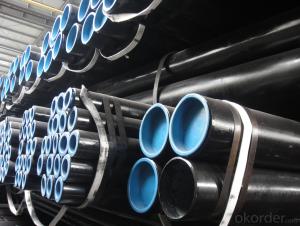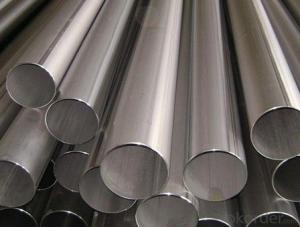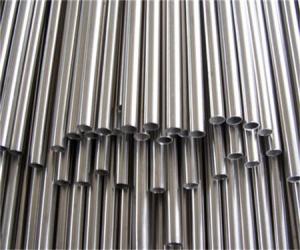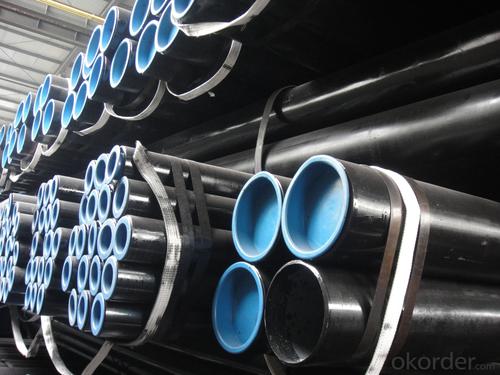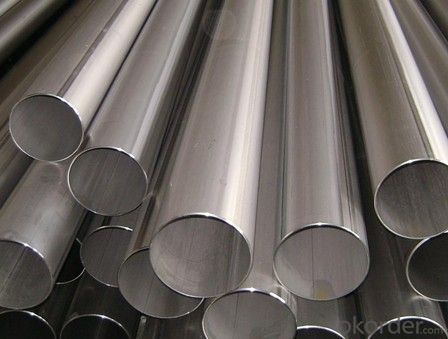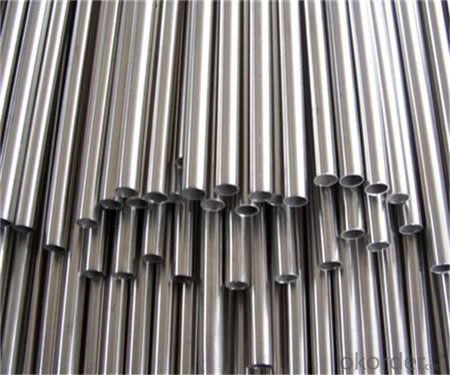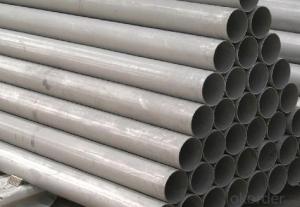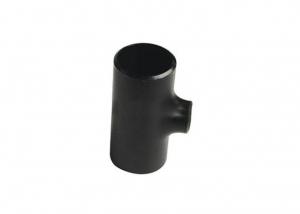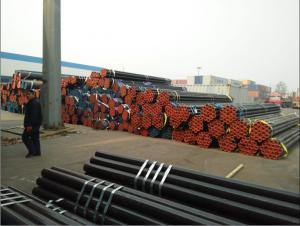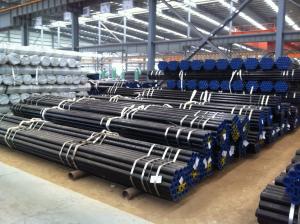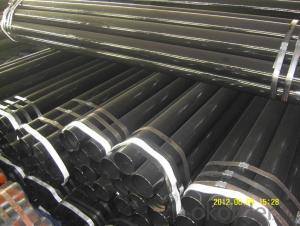Seamless Carbon Steel Pipe 3/4"-4"
- Loading Port:
- China Main Port
- Payment Terms:
- TT or LC
- Min Order Qty:
- -
- Supply Capability:
- -
OKorder Service Pledge
OKorder Financial Service
You Might Also Like
1、Structure of Seamless Pipe :
Seamless pipe is formed by drawing a solid billet over a piercing rod to create the hollow shell. As the manufacturing process does not include any welding, seamless pipes are perceived to be stronger and more reliable. Historically seamless pipe was regarded as withstanding pressure better than other types, and was often more easily available than welded pipe.
2、Main Features of the Seamless Pipe :
• High manufacturing accuracy
• High strength
• Small inertia resistance
• Strong heat dissipation ability
• Good visual effect
• Reasonable price
3、Seamless Pipe Specification:
Standard | GB, DIN, ASTM ASTM A106-2006, ASTM A53-2007 |
Grade | 10#-45#, 16Mn 10#, 20#, 45#, 16Mn |
Thickness | 8 - 33 mm |
Section Shape | Round |
Outer Diameter | 133 - 219 mm |
Place of Origin | Shandong, China (Mainland) |
Secondary Or Not | Non-secondary |
Application | Hydraulic Pipe |
Technique | Cold Drawn |
Certification | API |
Surface Treatment | factory state or painted black |
Special Pipe | API Pipe |
Alloy Or Not | Non-alloy |
Length | 5-12M |
Outer Diameter | 21.3-610mm |
Grade | 20#, 45#, Q345, API J55, API K55, API L80, API N80, API P110, A53B |
Standard | ASME, ASTM |
Models of Steel Pipes | Chemical Component | |||||||
Steel 20 (ASTM A106B) | C | Si | Mn | P | S | Cu | Ni | Cr |
0.17~0.24 | 0.17~0.37 | 0.35~0.65 | 0.035max | 0.035max | 0.25max | 0.25max | 0.25max | |
Steel45 (ASTM 1045) | 0.42~0.50 | 0.17~0.37 | 0.50~0.80 | 0.035max | 0.035max | 0.25max | 0.25max | 0.25max |
16Mn(Q345B) | 0.12~0.20 | 0.20~0.55 | 1.20~1.60 | 0.035max | 0.035max | 0.25max | 0.25max | 0.25max |
45Mn2 ( ASTM1345) | 0.42~0.49 | 0.17~0.37 | 1.40~1.80 | 0.035max | 0.035max | 0.3max | 0.3max | 0.30max |
4、Packaging & Delivery
Packaging Details: | seaworthy package,bundles wrapped with strong steel strip |
Delivery Detail: | 15-30days after received 30%TT |
5、FAQ of Seamless Pipe :
①How is the quality of your products?
Our products are manufactured strictly according to national and internaional standard, and we take a test on every pipe before delivered out. If you want see our quality certifications and all kinds of testing report, please just ask us for it.
Guaranteed: If products’ quality don’t accord to discription as we give or the promise before you place order, we promise 100% refund.
②How about price?
Yes, we are factory and be able to give you lowest price below market one, and we have a policy that “ for saving time and absolutely honest business attitude, we quote as lowest as possible for any customer, and discount can be given according to quantity”,if you like bargain and factory price is not low enough as you think, just don’t waste your time.Please trust the quotation we would give you, it is professional one.
③Why should you chose us?
Chose happens because of quality, then price, We can give you both.Additionally, we can also offer professional products inquiry, products knowledge train(for agents), smooth goods delivery, exellent customer solution proposals.Our service formula: good quality+good price+good service=customer’s trust
SGS test is available, customer inspection before shipping is welcome, third party inspection is no problem.
Any question, pls feel free to contact us !
6、Seamless Pipe ASTM A106/53 Images:
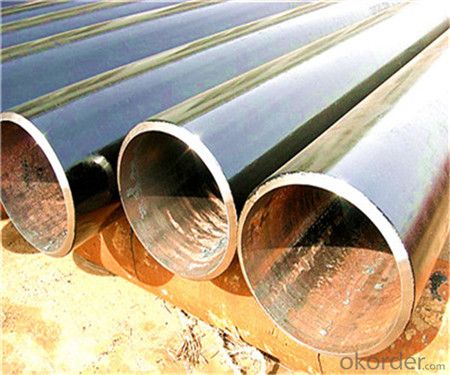
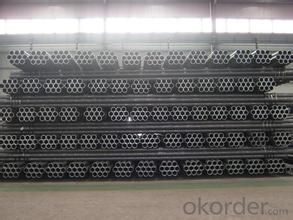
- Q: Can steel pipes be galvanized?
- Yes, steel pipes can be galvanized.
- Q: What are the different methods of testing steel pipes?
- There are several methods of testing steel pipes, including non-destructive testing methods such as ultrasonic testing, magnetic particle testing, liquid penetrant testing, and radiographic testing. Destructive testing methods like tensile testing, bend testing, and impact testing can also be used to assess the strength and integrity of steel pipes.
- Q: How are steel pipes used in petrochemical plants?
- Steel pipes are extensively used in petrochemical plants for various applications such as transporting fluids, gases, and chemicals. These pipes are commonly used for the transfer of raw materials, intermediates, and finished products within the plant. They are also utilized for process lines, cooling systems, and as structural components in petrochemical plants. The durable and corrosion-resistant nature of steel makes it an ideal choice for withstanding the harsh conditions and high-pressure environments typically found in these facilities.
- Q: Can steel pipes be used for the construction of offshore wind farms?
- Yes, steel pipes can be used for the construction of offshore wind farms. Steel pipes are commonly used for various offshore applications, including the installation of wind turbine foundations, subsea cables, and other infrastructure. They offer durability, strength, and resistance to corrosion, making them suitable for the challenging marine environment. Additionally, steel pipes can be easily fabricated and installed, allowing for efficient construction processes in offshore wind farm projects.
- Q: Can steel pipes be used for underground geothermal systems?
- Indeed, underground geothermal systems can utilize steel pipes. Given their robustness and longevity, steel pipes are frequently employed in geothermal systems. They can endure the elevated temperatures and pressures inherent in the extraction and distribution of geothermal energy. Moreover, steel pipes exhibit excellent resistance to corrosion, a crucial attribute when contending with the subterranean milieu and the diverse array of minerals and chemicals present in the soil. Furthermore, steel pipes possess versatility, enabling straightforward underground installation and connection, rendering them a fitting selection for geothermal systems.
- Q: What is the maximum pressure that steel pipes can withstand?
- The maximum pressure that steel pipes can withstand varies depending on factors such as the steel grade, pipe dimensions, and wall thickness. However, steel pipes are known for their high strength and durability, allowing them to withstand pressures ranging from a few hundred to several thousand pounds per square inch (psi).
- Q: How to make the steel pipe spray paint is not easy to fall off?
- You're not usually advised to do it yourself, because you can't do it yourself. General powder coating, spray before the treatment is very strict, to be high temperature baking, and their spraying are dry paint, it does not add hardening agent, that is, the surface dry, but not hard, not wear-resistant. So don't scrape off the paint, or you'll look good after spraying, and it will be ugly in a few days,.If you really like to look good, you can buy some stickers back to paste, without affecting the appearance..
- Q: How are steel pipes used in the manufacturing of geothermal systems?
- Steel pipes are used in the manufacturing of geothermal systems primarily for their durability and heat resistance. These pipes are used to transport geothermal fluids, such as water or steam, from the underground reservoir to the surface, where they can be utilized for heating or electricity generation. The high strength and corrosion resistance of steel pipes make them ideal for withstanding the harsh conditions and high temperatures encountered in geothermal applications. Additionally, steel pipes can be easily welded and connected, allowing for efficient installation and maintenance of geothermal systems.
- Q: Can steel pipes be used for transporting chemicals?
- Yes, steel pipes can be used for transporting chemicals. Steel pipes are known for their high strength and durability, making them suitable for handling various chemicals, including corrosive substances. Additionally, steel pipes can withstand high pressure and temperature conditions, ensuring the safe transportation of chemicals. However, it is essential to select the appropriate grade of steel and implement proper coating or lining to prevent chemical reactions or corrosion that may compromise the integrity of the pipes.
- Q: How are steel pipes classified based on their thickness?
- There are three main categories for classifying steel pipes based on their thickness: Schedule, Nominal Pipe Size (NPS), and Wall Thickness. In North America, the Schedule classification is commonly used and refers to the pipe's wall thickness. It is indicated by numbers like Schedule 10, Schedule 40, and Schedule 80, where a higher number means a thicker pipe. On the other hand, the Nominal Pipe Size (NPS) classification is used internationally and refers to the pipe's inside diameter. It is expressed in inches and is usually followed by a schedule number to indicate the wall thickness. For example, NPS 6 Schedule 40 means a pipe with a 6-inch inside diameter and a wall thickness according to Schedule 40. Additionally, steel pipes can be classified based on their wall thickness in millimeters or inches. This classification provides a more precise measurement of the pipe's thickness and is commonly referred to as the "wall thickness" or "wt" in specifications. The wall thickness is measured from the outside diameter to the inside diameter and can be expressed in various units of measurement like millimeters, inches, or gauge. In summary, steel pipes are classified based on their thickness using different systems such as Schedule, Nominal Pipe Size (NPS), and Wall Thickness. These classifications ensure the selection of the appropriate pipe for specific applications, taking into account factors such as pressure requirements, structural integrity, and compatibility with other system components.
Send your message to us
Seamless Carbon Steel Pipe 3/4"-4"
- Loading Port:
- China Main Port
- Payment Terms:
- TT or LC
- Min Order Qty:
- -
- Supply Capability:
- -
OKorder Service Pledge
OKorder Financial Service
Similar products
Hot products
Hot Searches
Related keywords
